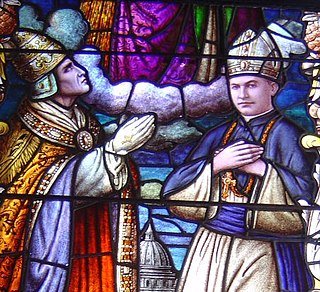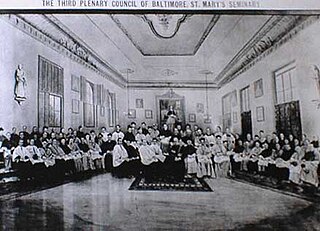Related Research Articles
A parish is a territorial entity in many Christian denominations, constituting a division within a diocese. A parish is under the pastoral care and clerical jurisdiction of a priest, often termed a parish priest, who might be assisted by one or more curates, and who operates from a parish church. Historically, a parish often covered the same geographical area as a manor. Its association with the parish church remains paramount.
An ecclesiastical court, also called court Christian or court spiritual, is any of certain courts having jurisdiction mainly in spiritual or religious matters. In the Middle Ages these courts had much wider powers in many areas of Europe than before the development of nation states. They were experts in interpreting canon law, a basis of which was the Corpus Juris Civilis of Justinian which is considered the source of the civil law legal tradition.
A pastoral council is a consultative body in dioceses and parishes of the Roman Catholic Church that serves to advise the parish priest or bishop about pastoral issues. The council's main purpose is to investigate, reflect and reach conclusions about pastoral matters to recommend to the parish priest or bishop as appropriate.

In Christian churches with episcopal polity, the rank of metropolitan bishop, or simply metropolitan, pertains to the diocesan bishop or archbishop of a metropolis.
In Catholic canon law, an interdict is an ecclesiastical censure, or ban that prohibits persons, certain active Church individuals or groups from participating in certain rites, or that the rites and services of the church are banished from having validity in certain territories for a limited or extended time.
Sede vacante is a term for the state of an episcopal see while without a bishop. In the canon law of the Catholic Church, the term is used to refer to the vacancy of any see of a particular church, but it comes into especially wide journalistic use when the see is that of the papacy.

A canon is a member of certain bodies subject to an ecclesiastical rule.

An ordinary is an officer of a church or civic authority who by reason of office has ordinary power to execute laws.
A vicar general is the principal deputy of the bishop of a diocese for the exercise of administrative authority and possesses the title of local ordinary. As vicar of the bishop, the vicar general exercises the bishop's ordinary executive power over the entire diocese and, thus, is the highest official in a diocese or other particular church after the diocesan bishop or his equivalent in canon law. The title normally occurs only in Western Christian churches, such as the Latin Church of the Catholic Church and the Anglican Communion. Among the Eastern churches, the Mar Thoma Syrian Church of Kerala uses this title and remains an exception. The title for the equivalent officer in the Eastern churches is syncellus and protosyncellus.

The hierarchy of the Catholic Church consists of its bishops, priests, and deacons. In the ecclesiological sense of the term, "hierarchy" strictly means the "holy ordering" of the Church, the Body of Christ, so to respect the diversity of gifts and ministries necessary for genuine unity.

A diocesan administrator is a provisional ordinary of a Roman Catholic particular church.

A consultor is one who gives counsel, i.e., a counselor.

The Plenary Councils of Baltimore were three national meetings of Catholic bishops in the United States in 1852, 1866 and 1884 in Baltimore, Maryland.
A diocesan bishop, within various Christian traditions, is a bishop or archbishop in pastoral charge of a diocese or archdiocese.
Dimissorial letters are testimonial letters given by a bishop or by a competent religious superior to his subjects in order that they may be ordained by another bishop. Such letters testify that the subject has all the qualities demanded by canon law for the reception of the order in question, and request the bishop to whom they are addressed to ordain him.

In the Catholic Church, a bishop is an ordained minister who holds the fullness of the sacrament of holy orders and is responsible for teaching doctrine, governing Catholics in his jurisdiction, sanctifying the world and representing the Church. Catholics trace the origins of the office of bishop to the apostles, who it is believed were endowed with a special charism by the Holy Spirit at Pentecost. Catholics believe this special charism has been transmitted through an unbroken succession of bishops by the laying on of hands in the sacrament of holy orders.
In the Roman Catholic Church, a parish is a stable community of the faithful within a particular church, whose pastoral care has been entrusted to a parish priest, under the authority of the diocesan bishop. It is the lowest ecclesiastical subdivision in the Catholic episcopal polity, and the primary constituent unit of a diocese. In the 1983 Code of Canon Law, parishes are constituted under cc. 515–552, entitled "Parishes, Pastors, and Parochial Vicars."
The appointment of bishops in the Catholic Church is a complicated process. Outgoing bishops, neighbouring bishops, the faithful, the apostolic nuncio, various members of the Roman Curia, and the pope all have a role in the selection. The exact process varies based upon a number of factors, including whether the bishop is from the Latin Church or one of the Eastern Catholic Churches, the geographic location of the diocese, what office the candidate is being chosen to fill, and whether the candidate has previously been ordained to the episcopate.
The canonical situation of the Society of Saint Pius X (SSPX), a group founded in 1970 by Archbishop Marcel Lefebvre, is unresolved.
A particular church is an ecclesiastical community of faithful headed by a bishop, as defined by Catholic canon law and ecclesiology. A liturgical rite depends on the particular church the bishop belongs to. Thus "particular church" refers to an institution, and "liturgical rite" to its practices.
References
| This Catholic canon law–related article is a stub. You can help Wikipedia by expanding it. |